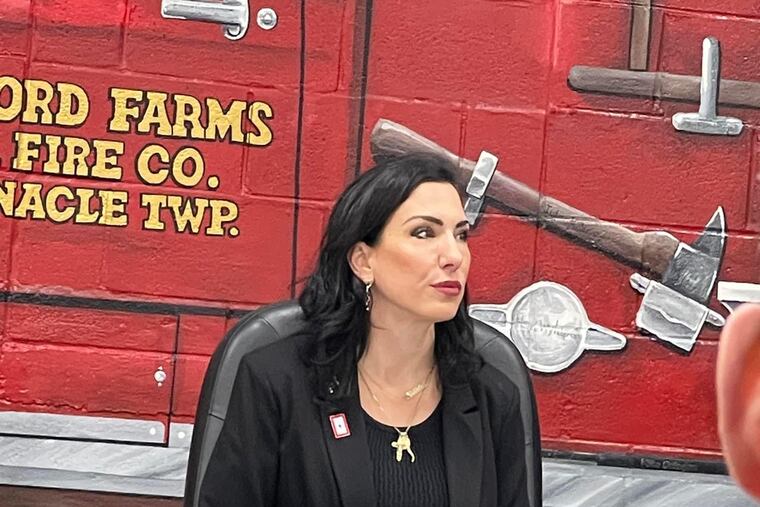A South Jersey deputy mayor who resigned over comments about ‘pineys’ says she was bullied
Stone, a Republican who had only been in office since January, said her saga began when she, along with other elected officials, voted in favor of demolishing Tabernacle’s 19th-century town hall.

The word piney is a point of pride for most people born and raised in New Jersey’s unique Pine Barrens.
The word is on bumper stickers and shirts and celebrated in books and films. Sometimes, however, the word piney can be used against them.
In Tabernacle, Burlington County, which dubs itself the “gateway to the pines,” former deputy mayor Natalie Stone resigned recently after someone dug up a Facebook group post she made about pineys before she was elected.
“There is ACTUAL TRUTH to Pineys being incestuous, illiterate, mentally deficient, inbred imbeciles supposedly responsible for generations of morons and prostitutes,” Stone wrote in 2020.
Stone apologized at a public meeting and told The Inquirer she was reading New Jersey’s Lost Piney Culture when she made the post in a Facebook group for the small development where she lived. Stone, who has acted in numerous films, said her resignation earlier this month, however, was the result of a persistent online bullying attack that began before the post was unearthed. She claims detractors created digitally altered photos of her, and made comments about her body and even the death of her child.
“The reason I left was because I realized I wouldn’t be able to get anything done when it was apparent that people would rather spend more time ridiculing committee members than working together to find solutions to the many issues in Tabernacle,” Stone wrote to The Inquirer Tuesday night.
Stone, a Republican who had been in office only since January, said her saga began when she, along with other elected officials, voted in favor of demolishing Tabernacle’s 19th-century town hall. Stone said the building had degraded “due to decades of neglect.”
That decision, Stone said, led to an “uncontrolled uproar” on social media, most of which was directed toward her and “not the two male committee members who voted the same.”
“There have been daily posts about me for two months straight,” Stone said.
Stone’s story has been chronicled at length by the Pine Barrens Tribune, a small, independent newspaper that covers the region. At an April public meeting after the post surfaced, the newspaper quoted committee member William Sprague Jr. asking whether Stone could be “fired.”
“She made racial remarks!” Sprague said, according to the newspaper.
The newspaper published a photo of Stone seemingly arguing with a local woman the publication described as a “transparency advocate.”
Several committee members, including Sprague, could not be reached for comment. Another declined. Jason Howell, a longtime Pine Barrens resident and environmental activist, blamed Stone’s resignation on a “small contingent of people who used toxic tactics to obtain the political will.”
Last year, The Inquirer interviewed author William J. Lewis about his book, New Jersey’s Lost Piney Culture, which is a celebration of the word piney. The book does delve into early misconceptions of Pine Barrens residents, including former New Jersey governor James F. Fielder’s stance that its residents should be sterilized.
Lewis, who grew up in the Pine Barrens, breaks down the subset of New Jerseyans into categories, including tree huggers, woods, and out-of-town pineys, to name a few.
“It isn’t derogatory to most people today, but for some, it is,” Lewis said last year.
Author John McPhee was credited for saving the region from development with his 1968 book The Pine Barrens. In it, McPhee immersed himself in piney culture and the way many there had lived off the land for generations.
“I guess a piney is something that gives a place identity. I guess it makes a place different from another place. The way I see it, I’m no different than the pines, or the animals and plants out here,” Bill Wasiowich, who was featured in McPhee’s book, said in 2012.
Stone, who was born in Philadelphia, and lived in neighboring Medford before moving to Tabernacle, appears to embrace the Pine Barrens in other social media posts and websites.
“New Jersey’s Pine Barrens are home to legends Natalie M. Stone and the Jersey Devil,” her IMDb.com biography begins.
Stone told The Inquirer she still intends to serve her community, “but not as a politician.”